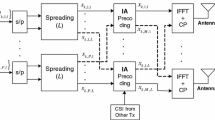Abstract
Iterative equalization using optimal multiuser detector and optimal channel decoder in coded CDMA systems improves the bit error rate (BER) performance tremendously. However, given large number of users employed in the system over multipath channels causing significant multiple-access interference (MAI) and intersymbol interference (ISI), the optimal multiuser detector is thus prohibitively complex. Therefore, the sub-optimal detectors such as low-complexity linear and non-linear equalizers have to be considered. In this paper, a novel low-complexity block decision feedback equalizer (DFE) is proposed for the synchronous CDMA system. Based on the conventional block DFE, the new method is developed by computing the reliable extrinsic log-likelihood ratio (LLR) using two consecutive received samples rather than one received sample in the literature. At each iteration, the estimated symbols by the equalizer is then saved as a priori information for next iteration. Simulation results demonstrate that the proposed low-complexity block DFE algorithm offers good performance gain over the conventional block DFE.



Similar content being viewed by others
References
Douillard C., et al. (1995) Iterative correction of intersymbol interference: Turbo-equalization. European Transactions on Telecommunications 6:507–511
C. Berrou, A. Glavieux and P. Thitimajshima, Near Shannon limit error-correcting and decoding: Turbo codes (1), Proc. IEEE Int. Conf. Commun., vol. 2, pp. 1064–1070, May 1993
Moher M. (1998) An iterative multiuser decoder for near-capacity communications. IEEE Transactions on Communications 46:870–880
Reed M. C., et al. (1998) Iterative multiuser detection for CDMA with FEC: Near single user performance. IEEE Transactions on Communications 46:1693–1699
Wang X., Poor H. V. (1999) Iterative (Turbo) soft interference cancellation and decoding for coded CDMA. IEEE Transactions on Communications 47:1046–1061
Tuchler M., Singer A. C., Koetter R. (2002) Minimum mean squared error equalization using a priori information. IEEE Transactions on Signal Processing 50:673–683
Tuchler M., Koetter R., Singer A. C. (2002) Turbo equalization: principles and new results. IEEE Transactions on Communications 50:754–767
Acknowledgment
This work was supported in part by the University of Missouri Research Board grant. The authors are grateful to Dr. C. Xiao for his helpful discussion.
Author information
Authors and Affiliations
Corresponding author
Rights and permissions
About this article
Cite this article
Leong, SY., Lee, KP. & Zheng, Y.R. Iterative Equalization using Improved Block DFE for Synchronous CDMA Systems. Int J Wireless Inf Networks 14, 55–62 (2007). https://doi.org/10.1007/s10776-006-0050-1
Received:
Accepted:
Published:
Issue Date:
DOI: https://doi.org/10.1007/s10776-006-0050-1




